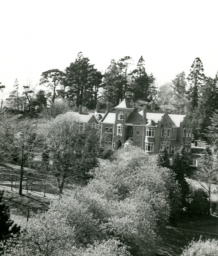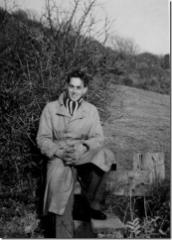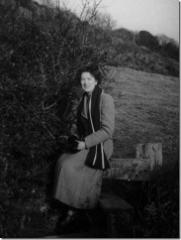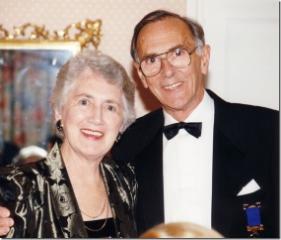
Exeter reflects on 95 years of exceptional education
Exeter reflects on 95 years of exceptional education
We recently published an article that marked 95 years since the University College of the South West of England (UCSWE) was established in Exeter. Between 1922 and 1955 UCSWE provided higher education for a great number of students; this was the period before the University of Exeter received its Royal Charter.
After asking for further memories in our previous article, we were contacted by two more UCSWE alumni who studied in Exeter in the 1940s and 1950s.
Derek Sowell
Derek Sowell (Geography, 1952) came to Exeter from Falmouth in September 1948, having spent three years in the R.A.F. Derek joined the Geography Department which was then in Gandy Street and the department head was Professor Davies, a Welshman and an expert on geographical exploration. Like most ex-servicemen, he lived in several digs together with two other students.
Derek reflected fondly on his time at UCSWE, he said: “I played in the University basketball team – one of the two sports at which we could beat St. Luke’s. The other sport was tennis.”
However, a love of sport and Geography wasn’t all that Derek fell in love with during his time in Exeter. He told us: “I met Sylvia Harrod, a fellow geographer who was a year ahead of me. Sylvia and I became close and we married in 1951 while she was in her first teaching post and I was teacher training. We recently celebrated sixty-five years of happy married life.”
After starting a family together and spending their life in the education sector, Derek and Sylvia now live in Hampshire. However, after all this time they still look back on their time in Exeter with fondness: “We frequently recall our university days – the ten o’clock curfew for Sylvia’s return to Hope Hall, canal walks and Saturday night hops at the Washington Singer.”



Derek and Sylvia at UCSWE in 1949 and today.
Peter Goodfellow
Peter Goodfellow (English, 1957) came to study in Exeter in 1954 and spent his time living in the University residence Crossmead. All the men who lived in Crossmead were nicknamed Jentlemen on account of the fact that Crossmead was the final stop of Exeter’s J bus.
Peter said: “Even though Crossmead was a Jentlemen-only hall, there was a social life with young ladies. However, my “birdwatching” was then of the feathered variety, and I didn’t end up courting an Exeter girl but instead married, June, the girl next door, in Plymouth, where we still live.”
“Invitations to Crossmead’s special occasions were much sought after. No other hall had a Garden Party like ours in the summer, when the avenue of Chestnut Trees and a wonderful Chinese Lantern Tree looked superb, and the grounds were filled with the splendour of young ladies wearing colourful dresses and garden party hats.”
“Jentlemen dressed formally for dinner, and for us, that meant “respectably” with tie and gown; indeed, Christmas Dinner was even more formal because we were expected to wear a dark suit and gown. We also dined at the High Table, at the invitation of the Warden, Dr. Heine Halberstam, who before dinner invited his and his wife’s guests to join them for sherry in his reception room in Hall.”
“The official running of Hall was ably organised by Matron, Miss St. John (with her enthusiastic Airedale terrier) who got to know her Jentlemen better when they were invited to her sitting room for tea and cakes.”
As well their social life at Crossmead, Peter also talked about their love of music and the radio while they lived at this residence. He said: “I remember that only a few Jentlemen relaxed or worked to music, played on their own record players. The radio event of the week was on Thursday when many Jentlemen rushed from dinner, gowns flying, to get a decent seat in the Common Room around the wooden cabinet of the radiogram to listen to “The Goon Show” and cheer Neddy and Bluebottle in their latest adventure.”
He also commented on general student life during his time at UCSWE: “The students’ committee looked after the Jentlemen’s welfare, arranged Crossmead’s special events, and liaised with Matron and the Warden. Committee and General meetings were usually after formal dinner. By the time they took place it was “late”, maybe gone 8.30pm. So, in 1956 the Committee, of which I was secretary, found a loophole in the dress regulations and, so that Jentlemen could go straight to bed after a meeting, we dressed in pyjamas and tie and gown.”
“Chef fed us well, I remember only once that Chef made a mistake. On that occasion, formal dinner’s main course was tripe cooked in cider, which meant that it was served in a sickly green sauce. Protests to Matron resulted in tins of corned beef being opened. And life went on. Some of us lived in Crossmead for three years, had our bag of dirty laundry collected every week and returned all clean several days later, and never learned to cook anything except a mug of tea or coffee, brewed at the drinks table on the upper landing.”
Finally Peter recalled the song that the residents of Crossmead would sing during their time at UCSWE. He said: “To a well-known song from Mozart’s Eine Kleine Nachtmusic, we enthusiastically sang:
C-R-O-S-S-M-E-A-D !
C-R-O-S-S-M-E-A-D !
Crossmead, way up on Dunsford Hill,
Where social life is nil,
An ever rising bill,
Way up on Duns---ford Hill.
J for Jentlemen,
Jentlemen, Jentle, Jentle, Jentlemen!”
* image top right courtesy of Peter Goodfellow
If you have memories of UCSWE and would like to get in touch, please email Emma at alumni@exeter.ac.uk
Date: 15 May 2017
